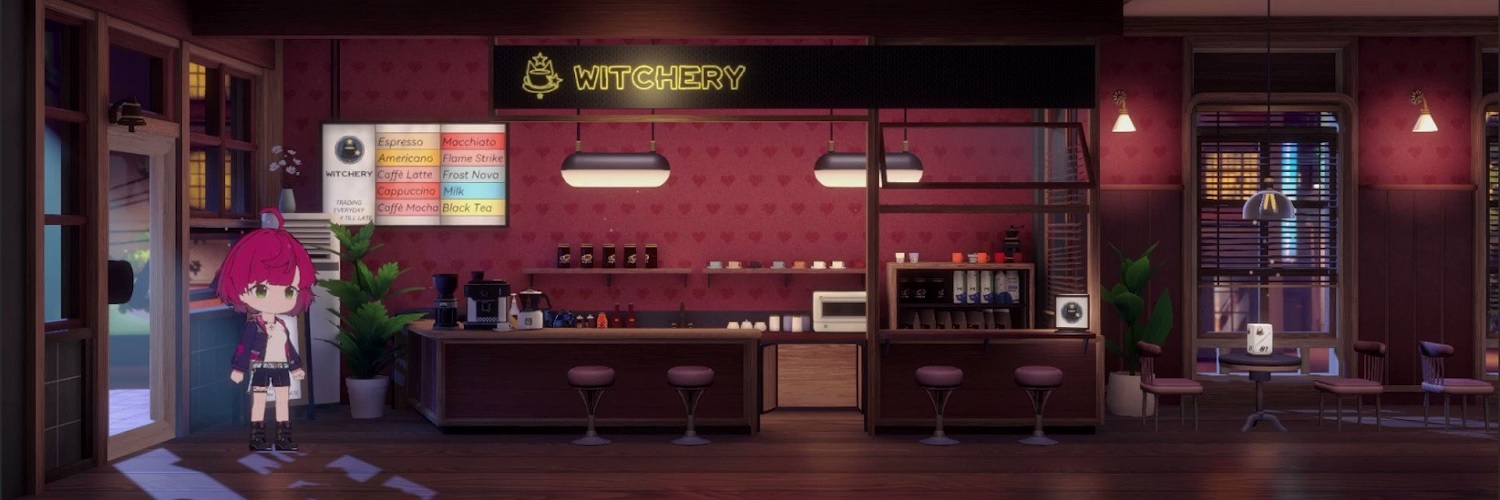
Affogato PC Review
One thing that excites me about this current age of video games is the power given to creators through more accessible means to develop video games, which has enabled small indie teams to craft something that little bit different. Affogato is one such title, with developer Befun Studio stating that this is an RPG that revolves around a reverse tower defence mechanic with anime visuals. But that is not all, as on top of that, Affogato adds in a blend of day-to-day social life and friendship bonding, think something along the lines of the recent Persona games. There are also visual novel elements, along with looking after a new café and managing the debts of renting such a place. Lastly, throw in a sort of Cooking Mama-lite mini-game to make coffee for your customers. Yep, Affogato is a strange blend of a game, but I guess like with coffee in the world, to know if something works or not you have to experiment. Without trying you can never know if it works, and Affogato somehow manages to create a blend that does.
Affogato, named after an Italian coffee-based dessert, is the titular heroine of the game whom the player controls throughout the story. The young, redhead, sorry magenta, as she happily corrects every person who misdescribes the colour of her hair and is a running theme throughout, has a love of coffee and has opened various coffee shops in previous towns. Now she’s in the city of Arorua with her new café and wants to share the wonders of the black liquid with new customers. Affogato is rather special because she is a witch, but one who has a demon pact with Mephista, a powerful archdemon who deep down is happy to be around Affogato. Mephista is constantly around the witch, chipping in with her eccentric personality, forming the game’s duo main cast for some fun highlights throughout the story. While Affogato works earning money to pay for the rent to keep the café open, Affogato also gets involved with a local witch who informs her that strange events are happening around the city, and she wants Affogato to help her investigate what is going on.
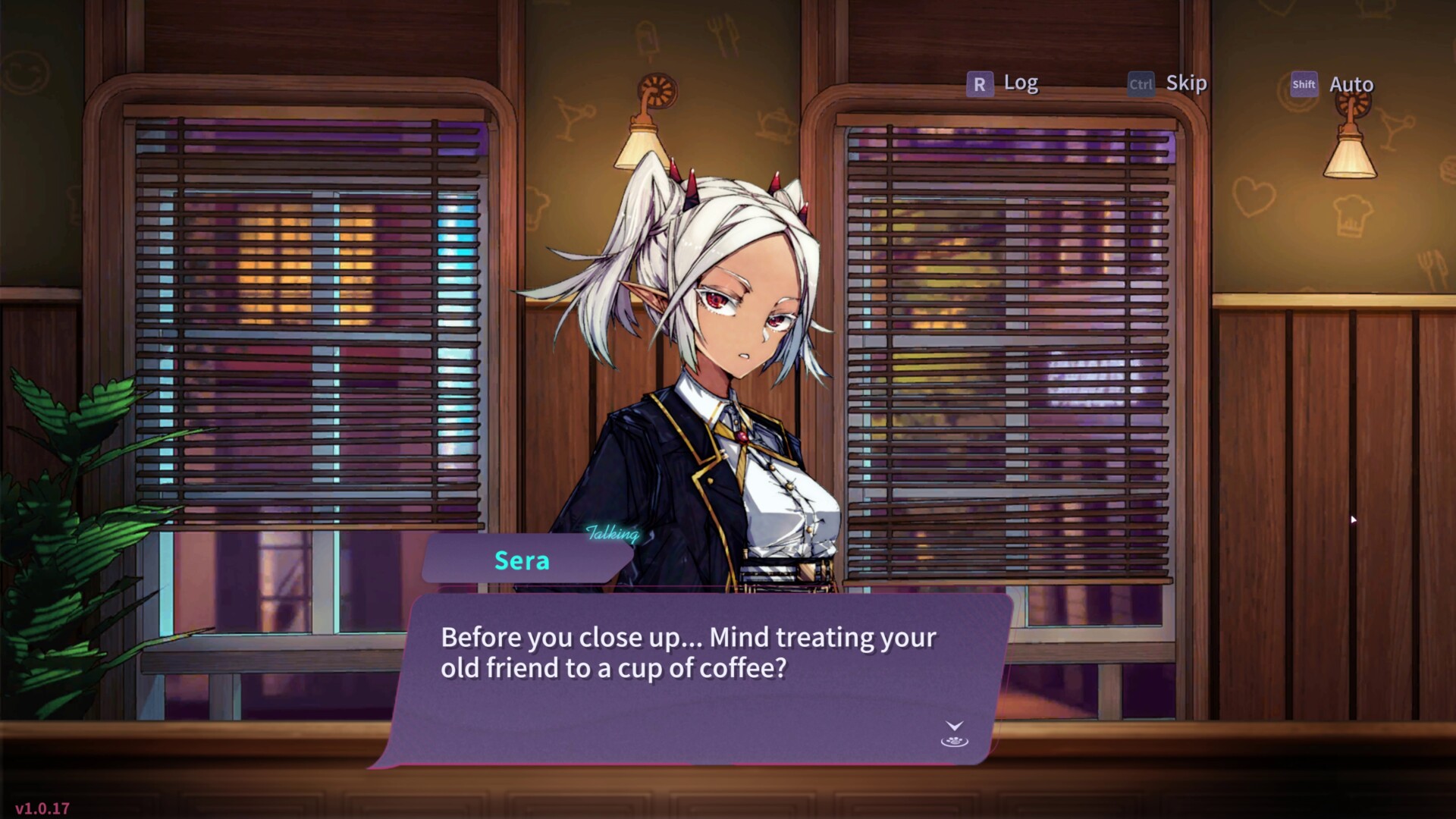
The story is heavily delivered through character portraits and dialogue boxes, like visual novel titles and JRPGs like Persona. As with those games, there can be scenes that go on for a rather lengthy time before the player is given control again, so be prepared to sit around for 15 minutes or so reading before the action continues. There are voiceovers, although in Japanese, for the major story scenes, which was surprising, as there is a fair amount of dialogue for a small game to go down the route of voicing the characters. The world is a fascinating one, which is mainly upheld by the characters Affogato meets in her coffee shop, who can then be interacted with to gain friendship and find out more about their struggles in life. There are some real-life topics touched upon under the light-hearted nature of the character interactions during their free time, such as the struggles with overworking and the difficulty with the cost of living. The writing is decent within its story beats over the game’s couple of months time scale that the plot covers. Overall, while there are some of those typical drawn-out dialogue scenes that seem to add nothing to the character or story that often comes from anime, the general writing is solid and enjoyable, but above all, is interesting to unravel the mystery that is unfolding in Arorua that began with school kids falling into comas and reveals itself like an attractive picture on a jigsaw puzzle as it comes together.
Affogato starts by throwing the player straight into its battle system to grab the attention of the player by battling demons while trying to save some lady called “Aoi”, which ends up being a fight in the future in the game. As the players, we do not exactly understand what is going on, only that the battles are set within the minds of the humans who are succumbing to the power of demons. This instantly makes an impression on the themes of the game, while using this open fight as a tutorial to learn the game’s reverse tower defence mechanics and its witch card summon system. The developers’ term of reverse tower defence refers to how the player is now on the offensive side of the gameplay. Each battle begins with a starting square on the grid route and requires placing a card, based on tarot cards, which will transition the battle into action and the unit spawned from the tarot card will begin walking forward automatically. Tarot card units cost a specific amount of Penta, a currency earned from defeating enemies or finding it as a treasure on the pathway. As Penta builds up, more units can be placed next to the current unit, forming a line of units as they walk forward, but you can only have the same type of tarot card unit active at one time, making each active unit different and adding a layer of strategy to the game.
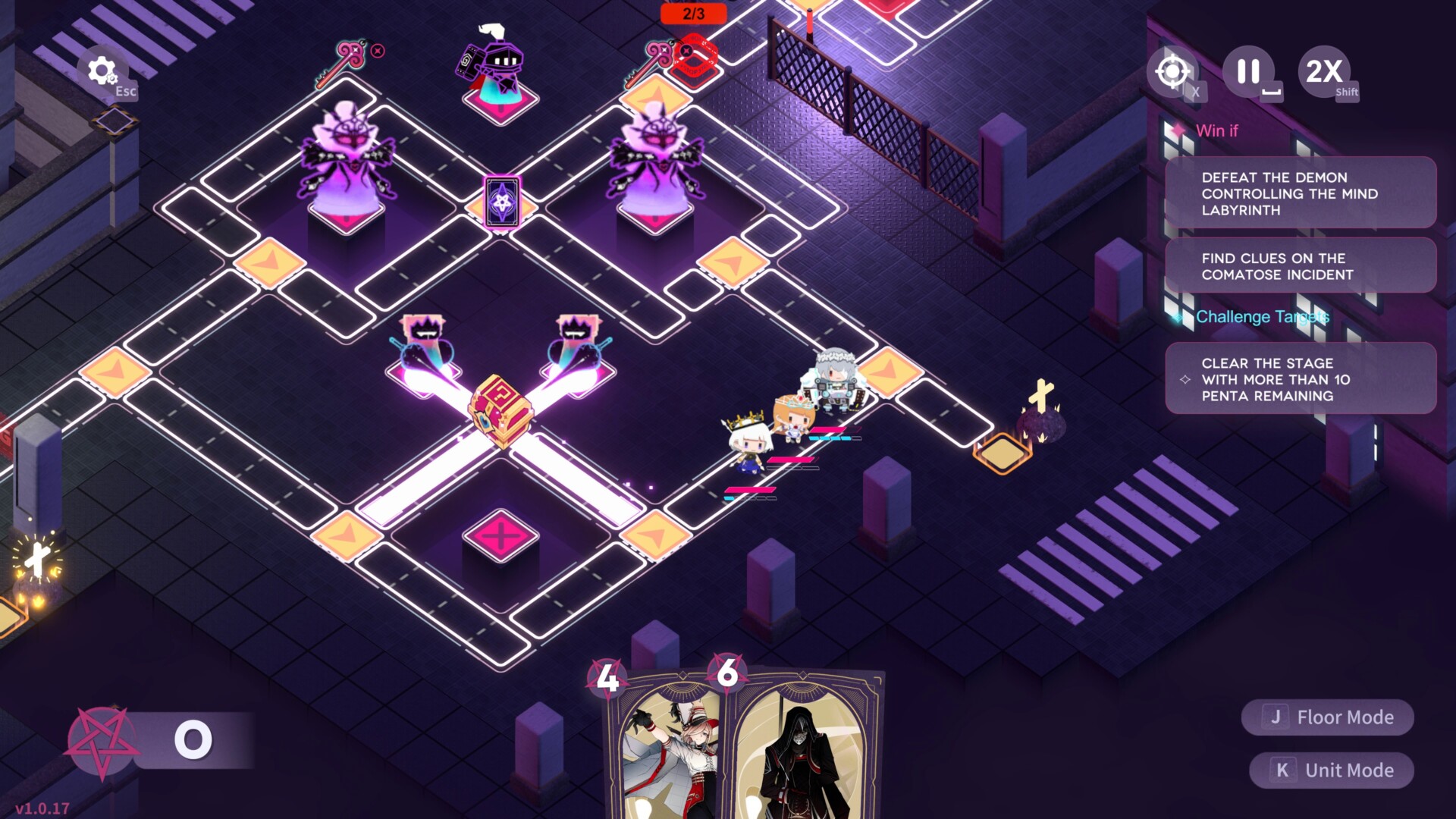
Situated around the map are enemy units that cannot move, but can attack with different forms. Standard enemies do not attack until the player unit is right next to them, but others have lengthy beams that can cover several grids in front of them. Others have abilities to charm or slow down friendly units. Part of the strategy in Affogato’s battles is to look at the grid and find the best route around the enemies to be able to take them out without taking damage. Yellow arrows signal the route in which friendly units will travel and these can be turned, like railroad tracks, to send the units down different pathways. There is a double speed and a pause button to help with speeding up or halting game time to allow the player a bit of breathing room to evaluate the map and switch route arrows. Units can easily be killed off by enemies if sent down the wrong pathway and to get them back requires their cost in Penta, often double the cost of the original summon, to place them back on the grid. These route arrows can also split the friendly units as they cross over, adding another small tactic to take enemies from both sides, as enemy units are often surrounded by multiple routes around them.
Having the right cards is critical it seems. I became reliant on starting with the strength card first, as on the first summon this card is the cheapest and is one of the best standard damage dealers, but on one specific map, I could not find the right path and kept losing my strength card before being able to get a good flow of units summoned. This is where the Hermit is handy, as for each attack it does, it gains Penta, up to a maximum of eight, which enabled me to summon a couple more units, The World, who heals units after dealing some damage and The Chariot, who cannot attack, but takes damage with its high health pool and casts a shield on friendly units after taking a certain amount of damage, helped me overcome the challenge. Each unit has its perfect situation for use. Justice is one that once has a full bar of energy charged from dealing damage, gives a silence card that can be used for one Penta that will stop enemy units from attacking for a short amount of time. This is great on big units that take a lot of hits to kill but can deal out fast damage on friendly units.
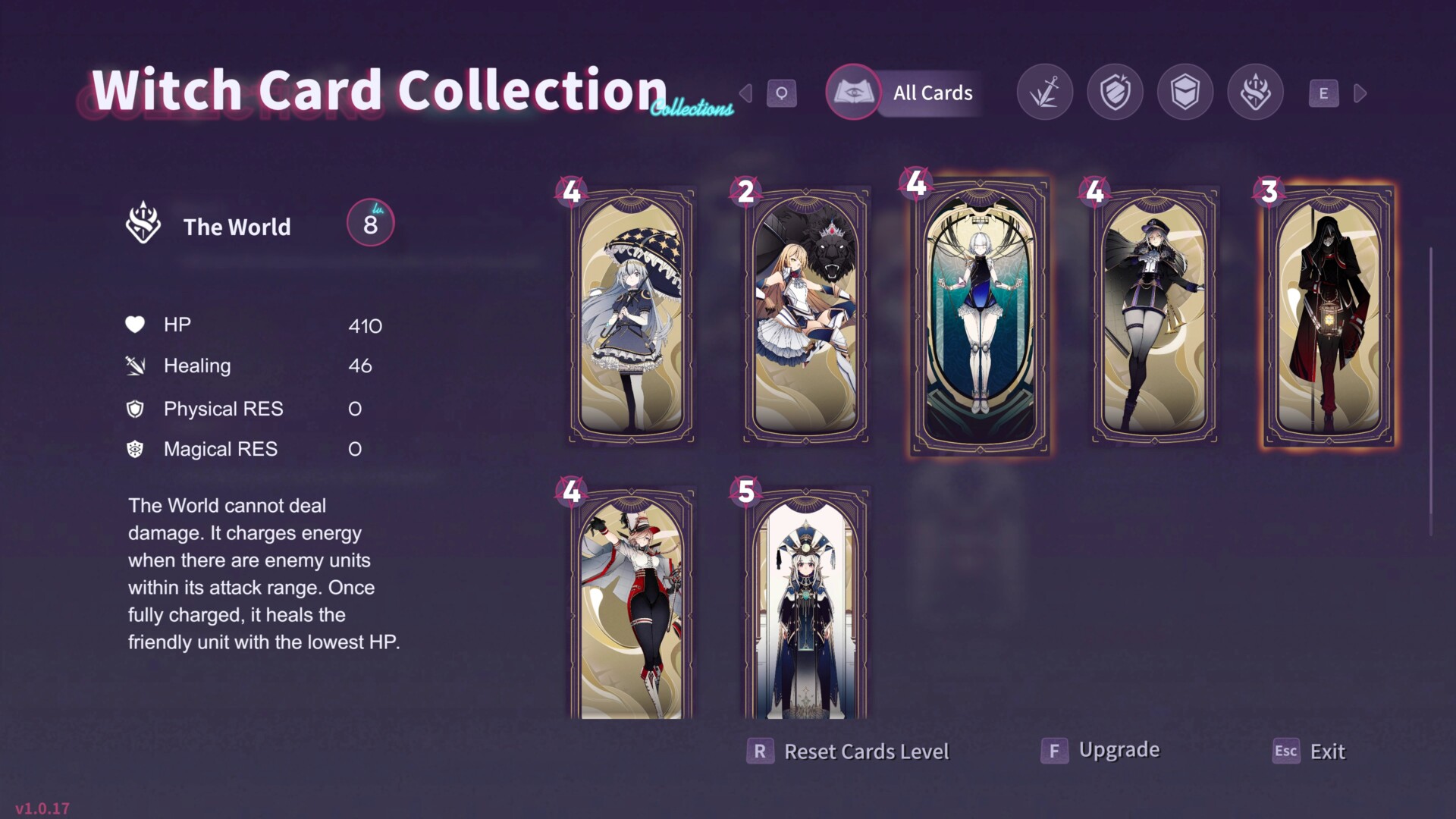
As the game progresses, the battle maps get bigger and more routes are placed in the fog of war to the sides, only revealing once walked into. These often hide treasure, money rewards (helpful for paying that rent), or a card that can either become a five Penta on use or a healing card that costs 2 penta for placing down a small grid that will heal units as they walk through it. New twists/gimmicks become part of the map changing the way they should be approached. An early one is switching between underwater or above ground, where underwater has its own set of enemies on the same map design, to make it easier to reach areas that might be overpowered with foes on the other side. The issue I found with this specific gimmick was it changed some of the fights into a trial and error because many times I had to restart the battle because I ran out of cards that switch between the two statuses of the map, and so was left unable to beat the final enemies that unlock the gate to end the mission. I am not much of a fan of this kind of learning and wish there was some way to gather those special cards back, as it feels like one mess-up ruins the battle and requires a restart to be able to complete it. I do have to say that all these small elements make for an interactive battle system that feels like solving a puzzle. It has the player managing a few elements to keep the mind working. It is not the most complex of systems seen for a battle system, but it has enough here to make it fun and engaging. It also helps that the battle music is fantastic.
Affogato has a calendar and time system that splits days into morning, evening and late evening, the latter made for catching up in the bedroom with Mephista to upgrade/purchase new tarot cards or chat about recent happenings or quests. There are deadlines for the main objective to be completed before that date hits but getting that out of the way leaves free time. This free time in the morning and evening can be used to work the café and take part in the Cooking Mama mini game where the player is tasked to mix ingredients together to make the requested customer’s drink. Players are also free to take to the streets and walk around a few areas to visit stores and shops to boost stats, such as intelligence or beauty, or find friends for short character events. As with any game that features heavy dialogue scenes through that typical visual novel template, there are times when it seems to be nothing more than nonsense, but with the story able to be the focal point, the option to ignore the character side stuff is there if it does not take your fancy.
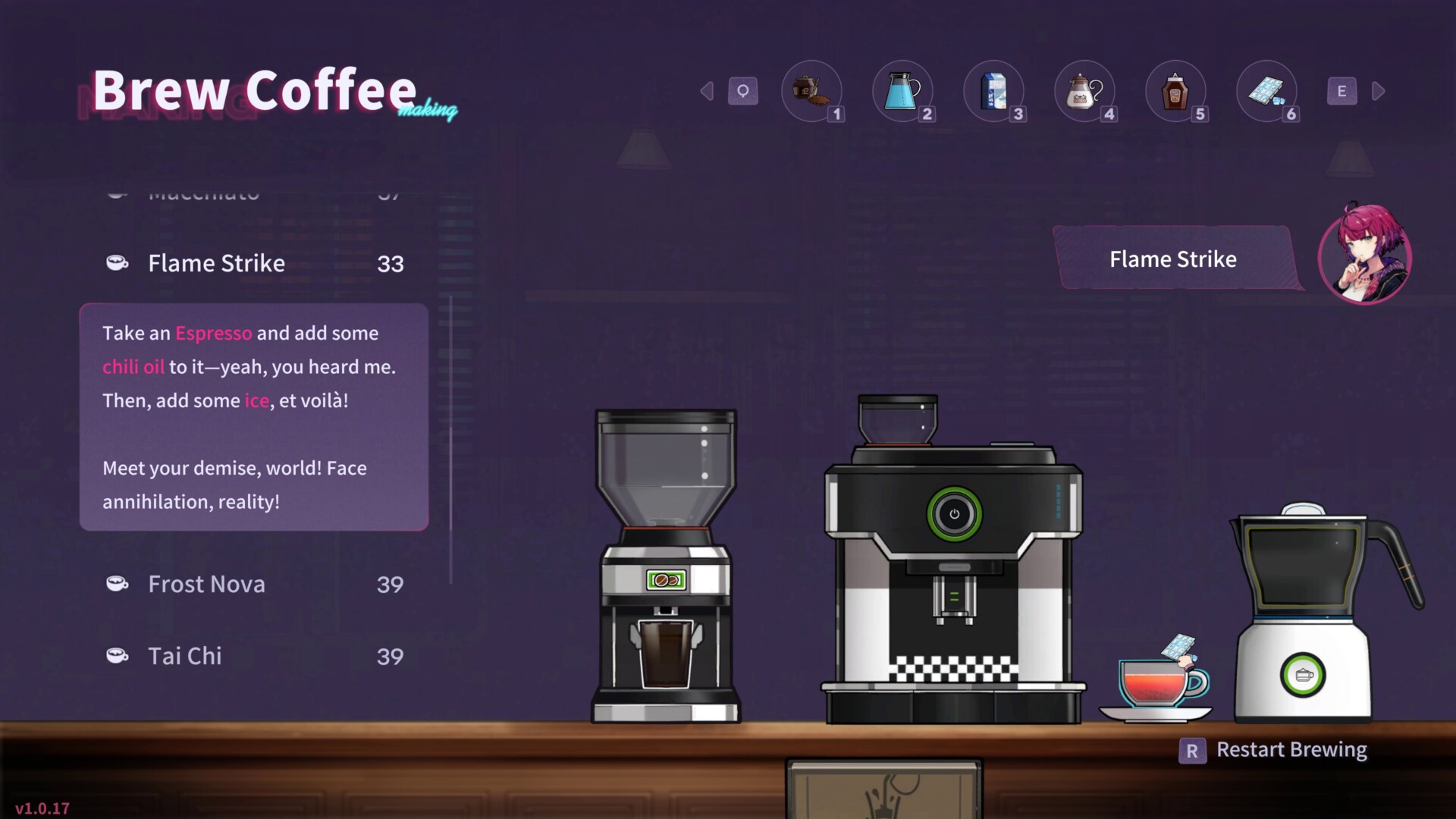
There is a contrast between the gameplay visuals and the character portrait art. The game goes for a cute Nendoroid chibi style, which I find rather adorable and works with the side camera view the game has for its exploration part. There is a charm to it in motion. The character art for portraits and general 2D assets, such as the cards, is fantastic. It is heavily inked with dark tones and black, which fits with the witch and demonic themes. Everything art-wise uses this stylish effect and looks fabulous, even the inventive coffee drinks that I am sure probably would not work in the real world, make me want to drink fancy coffee; they look tasty. The soundtrack is great, especially the already mentioned battle theme, but the rest of the soundtrack hits well with what is happening on screen, be it deep into an important story scene or the relaxing tunes while serving coffee to customers. The compositions nicely complement the activity.
I rather enjoyed my time with Affogato. The mixture of various elements comes together in a mixture that is satisfying enough to enjoy all aspects of them. The idea of being brave enough to combine reverse tower defence, card decks, time management, Persona style character relationships and some simple coffee-blending mini-games come together well. Some elements are better implemented than others. For example, do not expect as much depth in the free-time element as something like Persona 5, as really this part is not as fleshed out as it could be, and the coffee shop gameplay could easily be extended to be more complex and involving as a fully-fledged cafe owner. But it is understandable why all these were crafted as they are, adding some different flavour to compliment where most of the focus went to; the game’s interesting mix of strategy and tower defence gameplay. It is helped along by a well-written story and fun characters that while suffering from those anime exaggerations, remain interesting to see their stories out.
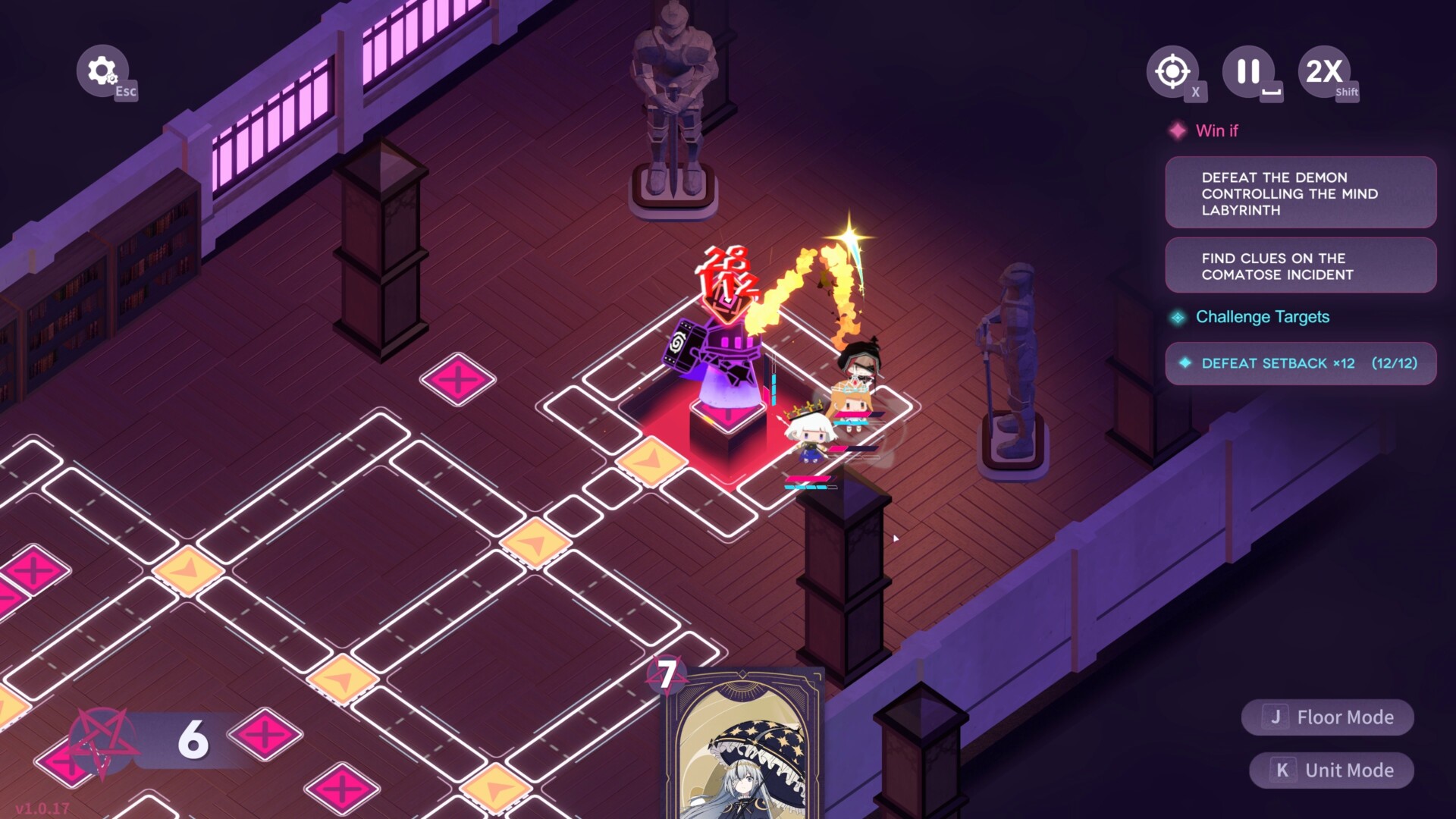
In summary, Affogato manages to offer an experience that does not overstay its welcome, clocking in around 14 or so hours including many battle restarts. Within that time, Affogato showcases many positives with its gameplay, visuals and story, but some of the added content away from its refreshing reverse tower defence strategy gameplay is less fleshed out than it could be. Still, Affogato is a good time, a solid blend of different elements that come together to bring a tasty offering that fans of such genres will most likely enjoy. Affogato is a value-worth, bite-size alternative to the big guns available on the market, and sometimes people just want that from time to time.
